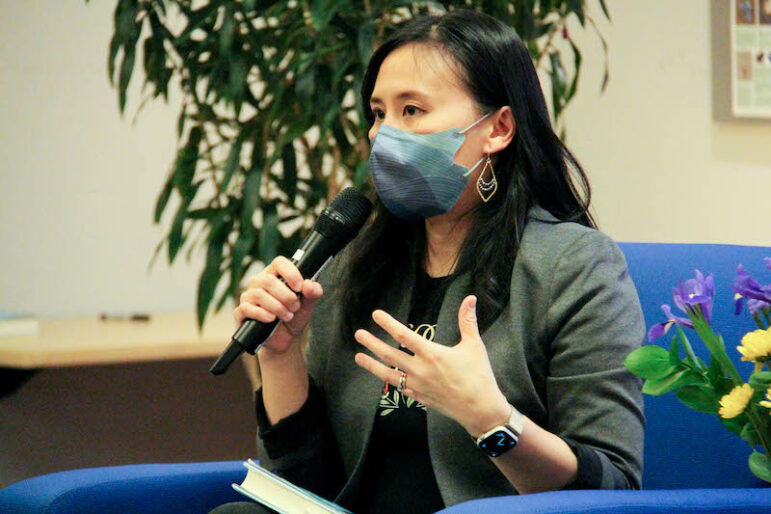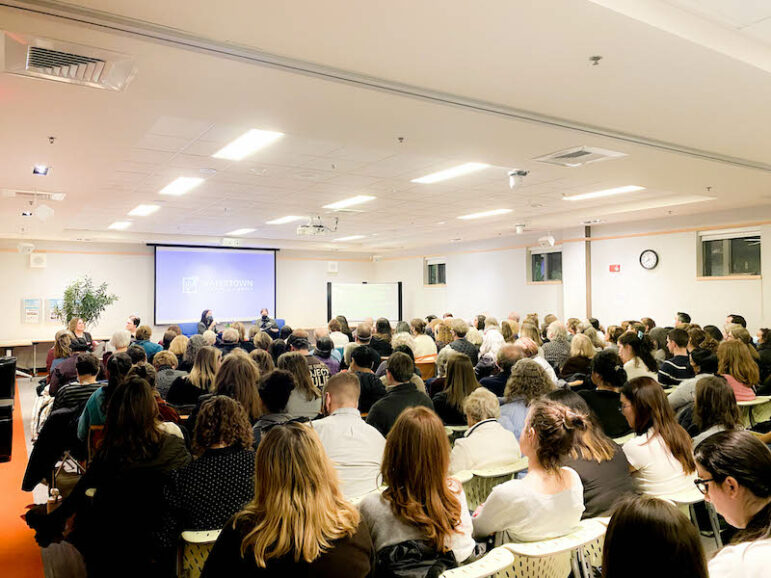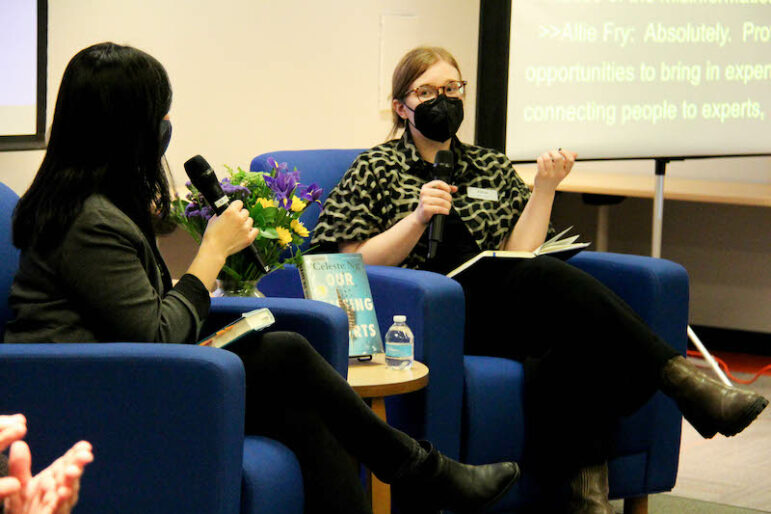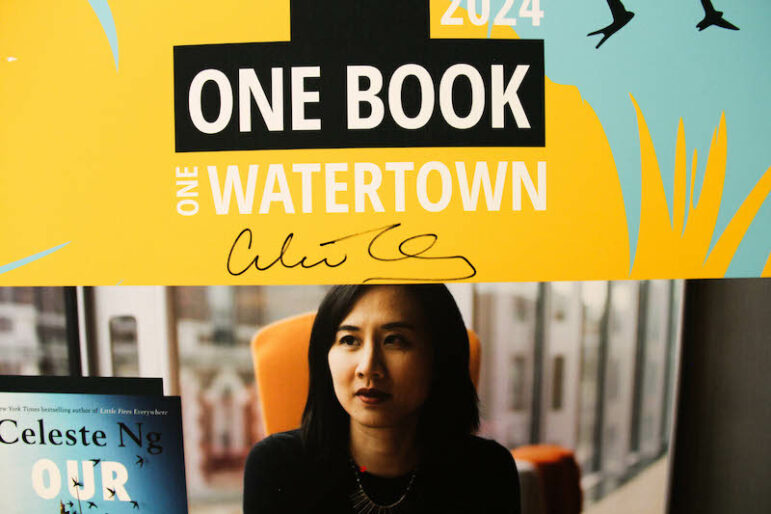
Bestselling author Celeste Ng, whose most recent novel explored dystopian fears increasingly echoed by real-life headlines, told library patrons in Watertown on March 21 that she holds hope for the future and a belief in the possibilities of art.
Ng, who lives in Cambridge, came to Watertown Free Public Library to discuss her novel “Our Missing Hearts,” the library’s 2024 selection for its One Book, One Watertown program. Each year, the library suggests a book for city residents to read, and hosts programs to foster a community-wide discussion around the book’s themes.
The novel, which is set in a fictional Cambridge, addresses many difficult themes, including fascism, book banning, anti-Asian bias, racial injustice and police brutality. In writing the book, Ng said she was working through questions of what individuals, and art, can accomplish in the face of large systemic problems.
“There’s this sense of, ‘Why are we fighting these fights because it feels like we’ve already lost,’” Ng said. “And I realized that art — because it’s showing something that doesn’t actually necessarily exist in the real world yet — it reminds us that the world can be different.”

Ng is also the author of “Everything I Never Told You,” and her 2017 novel “Little Fires Everywhere” later became a Hulu limited series starring Kerry Washington and Reese Witherspoon. Most recently, she collaborated with several other famous authors “Fourteen Days,” a novel that focuses on residents of New York’s Lower East Side during the early days of the COVID-19 pandemic.
“Our Missing Hearts” tells the story of Bird Gardner, a 12-year-old Cambridge boy navigating a dystopian, authoritarian America in which Asian Americans have become scapegoats and books get repurposed into toilet paper. In this fraught world, Bird must find his way as the child of a library employee father and a Chinese-American mother, whose work has been banned and who has disappeared into hiding after one of her poems, “All Our Missing Hearts,” is deemed subversive.
Ng, who started writing the book in 2016, said the concept initially came to her while finishing edits on “Little Fires Everywhere.” However, she set aside the book idea for a while and instead committed herself to writing a different story, she said.
“I wasn’t actually sure that I wanted to write this book,” Ng said. “I wasn’t sure anyone wanted to read it. I wasn’t sure I wanted to spend time thinking about those issues.”
However, the ideas for what would become “Our Missing Hearts” kept pulling at Ng, especially as current events took a more disturbing turn and the pandemic upended daily life, she said. She was drawn to exploring the character of Margaret, a Chinese-American mother, and the fear of a mother being separated from her child.

In particular, Ng said, she decided to write about “that sense of going through a world that’s falling apart, of feeling isolated, and sort of wondering, how do we deal with all of these really large-scale problems, especially at a time when it feels like one person’s actions don’t make a lot of difference, art doesn’t necessarily make a difference. It feels like a really hopeless time.”
The novel also reflects Ng’s attachment to libraries, she said, and “it was a no-brainer to make the librarians the heroes” in the story. As a child, she said, she was allowed to check out as many books as her small arms could carry, and today she goes to the Cambridge Public Library to meet with friends and to write. She recalled overhearing a reference librarian there patiently spending 15 or 20 minutes on the phone with a caller who was lost and needed help with directions. She said that libraries, with their no-questions-asked mission to help people access information, may be our most democratic institutions.
“I think that because the library is a place that really exists to give you information of all kinds, and to help you answer your questions, it’s such a powerful bulwark against fascism,” Ng said.

During the event, Watertown librarians talked about the threats faced by libraries, and what their library is doing to protect access to information and to a diverse range of ideas. Programming Librarian Allie Fry cited an American Library Association report stating that Massachusetts ranked fourth nationally in 2022 for attempts to restrict access to books. In this area, she said, people mistakenly assume that censorship happens only in other places.
“The reality is that we can really be one budget cut, one bad election, one unfilled board seat, from a much more dire scenario,” Fry said.
Library Director Kim Hewitt discussed the library’s new initiative, You Belong, as part of the library’s efforts to make the institution more welcoming and inclusive for the community. She said that initiative will include working on a new strategic plan and reviewing the library’s customer service; cultural competencies; policies and procedures with a focus on diversity, equity and inclusion; its world languages collection; and accessibility needs. She said the library will kick off the initiative with a free T-shirt giveaway on April 12 and 13.
“I think it’s an especially important time to remind everyone in our Watertown community that your stories matter, and they belong here too,” Hewitt said. “No matter who you are, or where you are from, you do belong.”

This was such a wonderful event. Thank you to the WFPL for putting this on! I feel lucky to live in Watertown where we have access to such enriching, and free, events!
How much “fascism, book banning, anti-Asian bias, racial injustice and police brutality” does Ng see in Cambridge, fictionalized or otherwise? I’m not denying it, just wondering. Cambridge might deny it, but then they would. Cambridge is dystopian, to be sure, but that’s just the roads. But then, those are soon to be our roads, so we can’t complain.